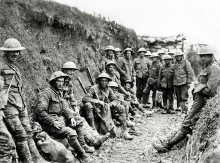The lamps are going out all over Europe; we shall not see them lit again in our lifetime.
Sir Edward Grey (1867-1933)
(remark, 3 August 1914, on the eve of Britain’s declaration of war against Germany)
The War was decided in the first twenty days of fighting, and all that happened afterwards consisted of battles which, however formidable and devastating, were but desperate and vain appeals against the decision of Fate.
Sir Winston Churchill (1874-1965)
(Preface to Spears, Liaison 1914)
Napoleon had said it was rare to find generals willing to fight battles. The curse [of World War I] was that so few could do anything else.
T. E. Lawrence (“of Arabia,” 1888-1933)
(The Science of Guerilla Warfare)
When every autumn people said it could not last through the winter, and when every spring there was still no end in sight, only the hope that out of it all some good would accrue to mankind kept men and nations fighting. When at last it was over, the war had many diverse results and one dominant one transcending all others: disillusion.
Barbara Tuchman (1912-1989)
(The Guns of August, “Afterward”)
Although many consider the opening act of World War I to be the assassination of Austrian
Archduke Franz Ferdinand at Sarajevo – its centennial was just a month ago (28 June) – the first actual declaration of war took place a hundred years ago today, when Austria-Hungary initiated hostilities against Serbia, after the latter rejected a draconian Austrian ultimatum intended to give Austria a free hand in bringing Franz Ferdinand’s killers to account. As a result, Russia – self-appointed protector of the “South Slavs” – mobilized against Austria, which panicked the Germans (fearful of a two-front war against both France and her Russian ally) and so it went…
28 July Austria declares war on Serbia
1 August Germany declares war on Russia
3 August Germany declares war on France
4 August Germany invades Belgium (to attack France)
England declares war on Germany in support of Belgium
6 August Austria-Hungary declares war on Russia
Serbia declares war on Germany
11 August France declares war on Austria-Hungary
12 August England declares war on Austria-Hungary**
After Germany’s long-intended encirclement of Paris (under the Schlieffen plan) was thwarted by the French and British in the Battle of the Marne, the struggle on the Western Front devolved into a four-year stalemate in which the principal protagonists faced off across a line of trenches that ran from the North Sea to the Swiss border. Despite the unprecedented bloodbath that ensued, virtually no additional ground was gained by either side before the end of the conflict in November 1918.
Despite the “war-guilt” clauses of the Treaty of Versailles, which held Germany largely responsible for the hostilities and imposed extraordinary penalties and reparations, the causes of the war have been debated endlessly for most of the last century. Of the dozen or so books on the subject, two recent ones have been particularly insightful: The Sleepwalkers by Christopher Clark (Harper’s, 2013) and The War That Ended Peace – The Road to 1914 by Margaret MacMillan (Random House, 2013).
Although there was certainly enough blame to go around, it was primarily Austria-Hungary that caused the catastrophe because of her reckless determination to settle long-standing scores with Serbia.
Be that as it may… One could argue that World War I was the greatest misfortune that ever befell Western civilization. It destroyed the West’s belief in inevitable human progress. It brought down the Austro-Hungarian, German, Russian, and Ottoman empires, bankrupted France and England, and put the British Empire on the skids. It was the proximate cause of the triumph of Communism in Russia and the formation of the Soviet Union, drove the United States into two decades of international isolation, and instilled in Germany a thirst for revenge that led directly to the rise of the Nazis and World War II.\ Moreover, in the Middle East, Britain’s and France’s cack-handed and self-serving division of the remains of the Ottoman Empire was largely responsible for all the turmoil we suffer there today.
Upon learning the terms of the Versailles treaty, Germany’s deposed Kaiser Wilhelm II (1859-1941) is supposed to have remarked from his exile in Holland, “The war to end war has resulted in a peace to end peace.”



Post a Reply